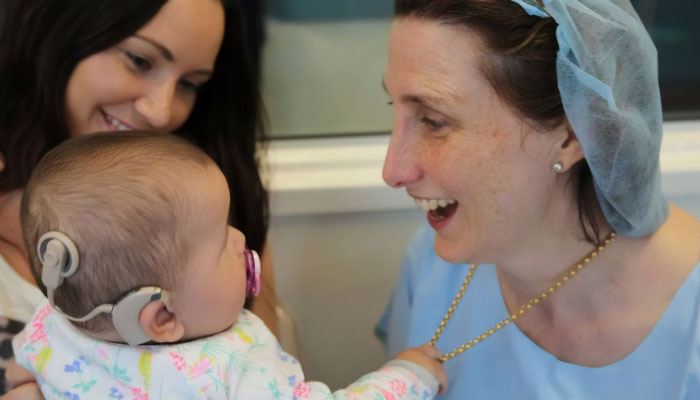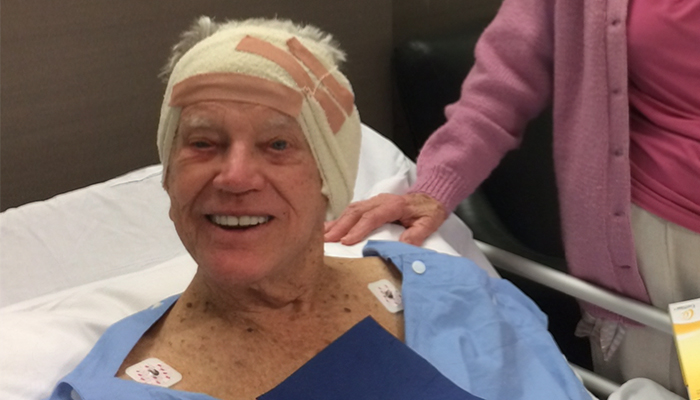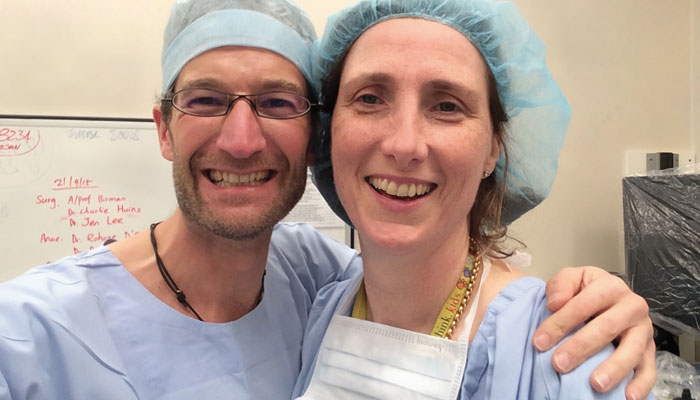Cochlear implants are being performed on about as many over-70 patients as under-18s, as a growing number of seniors realise that the devices can effectively compensate for age-related hearing loss when hearing aids no longer suffice.

The gift of sound: Associate Professor Catherine Birman is one of the world's most experienced cochlear implant surgeons.
Losing your hearing as you grow older can be isolating, humiliating and bad for your mental health. There’s increasing research linking hearing loss in older people with depression, and with dementia.
“Compensating for hearing loss is about improving your quality of life,” says Associate Professor Catherine Birman, a Conjoint Professor at Macquarie University who is one of the world’s most experienced cochlear implant surgeons. She was named 2017 NSW Premier’s Woman of the Year in recognition of her charity and medical work.
Birman, who is also the Medical Director of the SCIC Cochlear Implant Program, a service of the Royal Institute for Deaf and Blind Children, has performed more than a thousand cochlear implant procedures on patients aged from three months to 94 years.
Hearing loss can sneak up on people, and the early signs, like thinking everyone is mumbling when they talk to you, might go unnoticed.
“People get a hip replacement, if they need it; they get a knee replacement, if they need it; and increasingly people are accepting the idea that getting a cochlear replacement is something they could choose if hearing aids aren’t enough,” she says.
Turning the TV up?
Hearing loss can be insidious, particularly when it is age-related, she says.
“It can sneak up on people, and the early signs, like thinking everyone is mumbling when they talk to you, might go unnoticed; then you could find it harder to hear people on the phone, or need to turn the TV volume up.”

Quality of life: Associate Professor Catherine Birman's cochlear implant patient 92 year-old Cecil is one of a growing number of seniors opting for surgery when hearing aids no longer suffice.
Hearing loss becomes a problem when people find themselves unable to separate voices out in a crowded room and struggle to keep up with conversations.
“When you can't hear, you don't want to keep asking people to repeat what they said – so typically you start to avoid those situation."
Hearing aids can be helpful, but for some people, as their hearing loss becomes progressively greater, cochlear implants may offer better outcomes.
“People can find that, even with hearing aids, they can’t distinguish conversations from the background noise, they can’t hear the TV or talk to their family and friends – so they start to withdraw from society,” she says.
“Helen Keller once said that blindness cuts you off from things, but deafness cuts you off from people. Providing cochlear implants can allow people to reach back out to family and friends and be part of their community.”
Early hearing checks make a real difference
Birman says it’s important that people get their hearing checked early. “Start with your GP, who can check for other causes; they can then refer you to an audiologist, who can advise what’s going on with your hearing.”
Early intervention can make a real difference, she says.
About one in three Australians over 65 experience hearing loss; and as the population ages, more people will be affected.
- National screening program will test Aussie kids for hearing loss
- Aged care reforms stumble as older Australians struggle to stay at home
Cochlear, the world’s largest hearing implants manufacturer, has sold more than half a million of its devices, which electrically signal a receptor attached to the auditory nerve so that people with hearing loss can receive sound signals.
Hailed as a miracle for those with profound hearing loss, the devices have been targeted at young children because early implantation can help them learn language and speech at a critical time in their development.
Screening of newborns led to a rise in cochlear implants and most Australian children with profound hearing loss have now had implants before their third birthday.
As cochlear programs caught up with children and adults who had progressive hearing loss, implant rates have started to plateau since around 2008, Birman says.
But that’s starting to change, as the biggest market for cochlear implants is now older people, with Cochlear confirming last year that the seniors segment is the fastest growing market.

Helping people hear: Surgeon and Associate Professor Catherine Birman with ENT trainee Charlie Huins.
The chance to connect with community and family
“There’s about 150,000 people in Australia who have severe or profound hearing loss where they would hear more with a cochlear implant, than they do with a hearing aid,” says Birman.
She believes there should be no age limit when it comes to cochlear implants, which involve a straightforward operation that doesn't access the brain.
“Certainly for the elderly, we know that hearing loss leads to social isolation, depression and is an independent risk factor for dementia.”
For someone who has not been hearing for some time, the neural pathways may not have been used and it can take a while to reawaken the brain.
She says that older people with profound hearing loss do really well following a cochlear implant. “It allows them to connect with their community and their family, and it improves people’s confidence.”
Hearing through a cochlear implant can be quite different to normal hearing. “For someone who has not been hearing for some time, the neural pathways may not have been used and it can take a while to reawaken the brain,” Birman says.
“Typically after around three months, most recipients are doing very well, and they keep improving up to around 12 months after the implant, through neuroplasticity,” she says.
A new project at the Australian Hearing Hub at Macquarie under the Sydney Cochlear Implant Centre will research the link between cochlear implants and reduced cognitive decline in adults over 60.
This article was first published during Hearing Awareness Week 2019.
